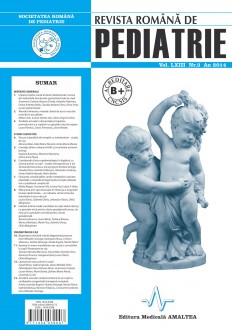SELECT ISSUE

Indexed

| |

|
|
|
| |
|
|
|

|
|
|
|
|
|
|
HIGHLIGHTS
National Awards “Science and Research”
NEW! RJP has announced the annually National Award for "Science and Research" for the best scientific articles published throughout the year in the official journal.
Read the Recommendations for the Conduct, Reporting, Editing, and Publication of Scholarly work in Medical Journals.
The published medical research literature is a global public good. Medical journal editors have a social responsibility to promote global health by publishing, whenever possible, research that furthers health worldwide.
THE PSYCHOSOCIAL IMPACT OF CHRONIC ABDOMINAL PAIN IN FUNCTIONAL GASTROINTESTINAL DISORDERS FOR BOTH CHILDREN AND ADOLESCENTS – CLINICAL AND THERAPEUTIC APPROACHES
Anamaria Ciubara, Roxana Chirita, Gabriela Paduraru, Dania Andreea Radu, Claudia Adriana Olaru, Ilinca Untu and Lucian Stefan Burlea
ABSTRACT
Both functional abdominal pain and irritable bowel syndrome are common causes of chronic abdominal pain in children and adolescents. Addressing these nosological entities is done according to the biopsychosocial model of functional gastrointestinal disorders, given their effect on quality of life and psychosocial status thereof. The cognitive-behavioral therapy, family psychotherapy, relaxation techniques or hypnotherapy have proved effective in achieving better coping mechanisms in alleviating psychological and somatic symptoms. However, antidepressant medication including selective serotonin reuptake inhibitors and tricyclic antidepressants, improve psychiatric symptomatology, especially depressive mood due to gastrointestinal illness, but also digestive symptoms due to mechanisms of action that depend on complex neurotransmitters.
Keywords: functional gastrointestinal disorders, pediatric population, biopsychosocial model, antidepressants, cognitive-behavioral therapy
